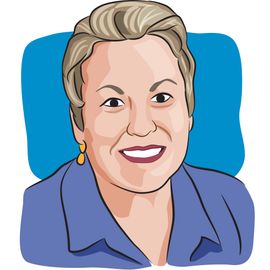- About Us
- Advertise / Support
- Editorial Board
- Contact Us
- CancerNetwork.com
- TargetedOnc.com
- OncLive.com
- OncNursingNews.com
- Terms & Conditions
- Privacy
- Do Not Sell My Information
- Washington My Health My Data
© 2025 MJH Life Sciences™ and CURE - Oncology & Cancer News for Patients & Caregivers. All rights reserved.
The Invisible Wound

Kathy LaTour is a breast cancer survivor, author of The Breast Cancer Companion and co-founder of CURE magazine. While cancer did not take her life, she has given it willingly to educate, empower and enlighten the newly diagnosed and those who care for them.
Post-cancer fatigue, a term coined by Wendy, has been her most challenging issue of survivorship.
Wendy Harpham knows her limits because she has to. If she ignores the signs that she is becoming fatigued, it can literally mean losing the ability to function to the point that she has to call her husband to pick her up from the mall instead of risking the drive home.
A feeling of debilitating tiredness or total lack of energy that lasts for days, weeks, months or longer, fatigue is the most common side effect of chemotherapy—more than nausea, pain or depression. The origins of fatigue not attributable to treatment-related anemia can be elusive at best or completely unknown at worst.
Post-cancer fatigue, a term coined by Wendy, has been her most challenging issue of survivorship. “Cancer fatigue is real and it’s different than what healthy people feel at the end of a long day,” she says. “And, unlike usual tiredness, post-cancer fatigue is not relieved with a good night’s rest, but rather becomes a chronic challenge of balancing work and life to function. It very much affects quality of life, but it can be managed with physical measures and with attitude.”
Symptoms can include feeling weak or worn out, having difficulty climbing stairs, walking short distances and performing simple daily tasks. It also can have myriad symptoms that may include difficulty concentrating, irritability, decreased sexual desire and clumsiness, says Wendy, whose day is built around knowing when she will need to rest to accomplish a task.
For Wendy persistent fatigue began after her third course of treatment, which was interferon. Since then she has been tested periodically for all potentially treatable conditions that can cause fatigue, none of which have proved to be the culprit.
“I am not anemic nor is my thyroid the problem,” she says, adding that her doctors tried medication, which caused intolerable side effects. She has since turned to trial and error to determine how to manage life with fatigue. She works out 40 or so minutes a day five or six days a week, naps each afternoon and manages her speaking around the need for rest. “I was a gymnast in college and have always worked out,” Wendy says. “But I learned that when I pushed myself after treatment, I felt worse, not better. So there is an optimum level of exercise that makes me better.”
Wendy didn’t speak publicly about her fatigue for years, until she was invited to address The Fatigue Coalition. “I always spoke and wrote about the things that I’d already worked through,” she says. “I refused to talk about fatigue because I was still struggling.”
But the invitation was one she couldn’t refuse. While working on the talk, Wendy had a number of revelations, understanding for the first time the impact her fatigue was having on her quality of life. “I realized that when people kept telling me I looked good or that they were tired, too, I lost my sense of normal. I couldn’t tell if I was really tired or maybe just being lazy.”
In an article she wrote on fatigue for CA: A Cancer Journal for Clinicians, Wendy described her attempts to manage the emotional aspects of fatigue. “Cancer-related fatigue can trigger sadness by reminding patients of their disease, consciously or subconsciously,” she wrote. “The obvious solution—resting well to avoid fatigue—can be dispiriting too: Patients trade the sadness that comes with feeling overtired for the grief that accompanies giving up activities they enjoy or want to do.”
Wendy’s recommendations for managing post-cancer fatigue include getting a full medical evaluation at each stage of survivorship, and optimizing nutrition, exercise, sleep, finances and emotional and spiritual issues.
For more information on fatigue, go to www.cancersymptoms.org.
Related Content:



